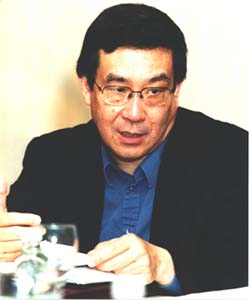|
Dr.
Tu Weiming is the Director of the Harvard Yenching Institute. He
has been a Professor of Chinese history and philosophy and of Confucian
Studies in the Department of East Asian Languages and Civilizations
at Harvard University since 1981. He earned a B.A. at Tunghai University
in Taiwan, and both an M.A. and Ph.D. in history and East Asian
languages at Harvard University. He is the first professor of Confucian
studies at any English-language university, a position awarded to
him in 1999.
A
member of the Committee on the Study of Religion at Harvard, the
chair of the Academic Sinica's advisory committee on the Institute
of Chinese Literature and Philosophy, and fellow of the American
Academy of Arts and Sciences, Professor Tu Weiming is currently
interpreting Confucian ethics as a spiritual resource for the emerging
global community. He taught for thirteen years at both Princeton
University and the University of California at Berkeley on the subject
of Chinese intellectual history. Additionally, he taught Confucian
humanism at Peking University in Taiwan, at the Chinese University
in Hong Kong, and the University of Paris.
He
is the author of major publications in Chinese and English, including:
Neo-Confucian Thought in Action: Wang Yang-ming's Youth; Centrality
and Commonality, An Essay on Confucian Religiousness; Humanity and
Self-Cultivation; Confucian Thought: Selfhood as Creative Transformation;
Wang, Learning, and Politics: Essays on the Confucian Intellectual.
He has contributed a section on Confucian spirituality to a forthcoming
encyclopedia on the history of the religious quest, and an essay
for a report of the U.S. President's Committee on the Arts and the
Humanities.
|
Dr.
Tu Weiming

|